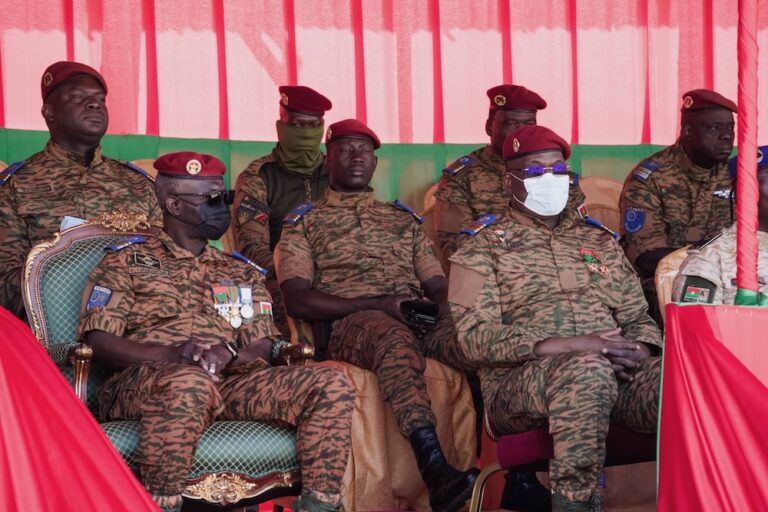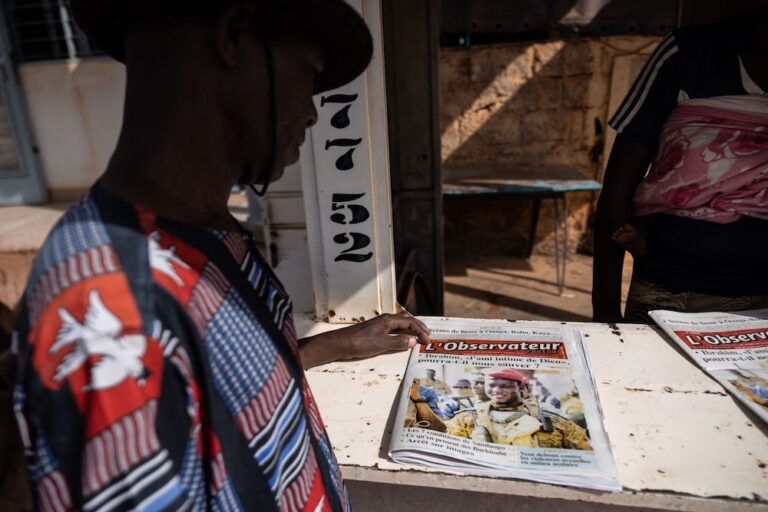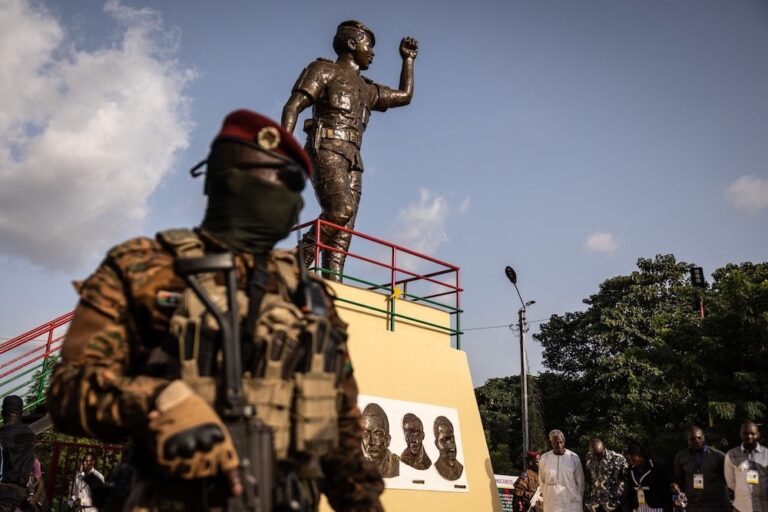(RSF/IFEX) – Until recently, the investigation into the 13 December 1998 murder of journalist Norbert Zongo was at a standstill. Now, however, new testimony could see Examining Judge Wenceslas Ilboudo reopen his investigation. Although six suspects were named by the independent commission of inquiry set up the day after the death of the editor, only […]
(RSF/IFEX) – Until recently, the investigation into the 13 December 1998 murder of journalist Norbert Zongo was at a standstill. Now, however, new testimony could see Examining Judge Wenceslas Ilboudo reopen his investigation. Although six suspects were named by the independent commission of inquiry set up the day after the death of the editor, only Warrant Officer Marcel Kafando has been charged to date.
On 7 October 2003, the Office of the President announced that it had foiled an attempted coup and that the Defence Ministry had arrested some of the persons suspected of playing a role in the plot. Upon his arrest, one of the soldiers, Sergeant Naon Babou, announced that he had revelations to make concerning the Zongo case. Babou, aged 38, a former member of the Presidential Guard Regiment (close to President Blaise Compaoré), is now accused of “undermining state security” and “treason”. Following the soldier’s statement, Judge Ilboudo immediately asked to interview him. The military authorities refused, but the judge repeated his request on 5 December.
Under guard at the Gendarmerie headquarters, Babou could still not be sent to see Judge Ilboudo because he was being questioned about the “coup attempt” by a military examining judge. According to information gathered by RSF, the civilian judge nevertheless received assurances that he would be able to question Babou shortly. Two other soldiers arrested in the same “coup attempt”, Abdoulaye Konfé and Souleymane Zalla, are also expected to be interviewed by Judge Ilboudo in the coming days. The two are being held at the Ouagadougou Gendarmerie. They were named by Babou as two former Presidential Guard members who, along with a third, now deceased soldier, Sié Poda, had been contacted to participate in Zongo’s murder in Sapouy, on 13 December 1998, but had refused.
Babou was not in Ouagadougou at the time of Zongo’s murder. He was accompanying President Compaoré on a visit to Sudan. It was only on his return to the capital on 14 December, the day after the murder, that he said he learned of the death of Zongo and his three companions.
Babou was interviewed several times by the military examining judge, Francis Somda, over the coup attempt against the current regime. RSF has obtained a copy of Babou’s testimony. On 30 October 2003, at 15:15 (local time), he said, “Everything began for me in 1998, upon the death of Norbert Zongo. The events occurred on 13 December and we came back from our trip with the president on 14 December. It was on returning home that I heard the news on the radio. One month later, on 15 January 1999, I went to see François Compaoré to inform him of my concerns. That day, I told him that if those who killed Norbert were members of the Presidential Guard, they were doing a disservice to the president, because the timing was bad, given that the investiture was about to take place.
“It was then that François asked me if I knew Norbert Zongo. And I told him ‘no.’ He also explained to me that Zongo thought that the president was in the process of preparing him to take over, and that Norbert had started to malign him in every possible way. Also he, François, could not understand why some elements within the presidential security service disapproved of what had happened to Norbert Zongo and even less so the officers. He then said that in relation to that, I, Babou, did not know that people could find themselves at Dori (a town far from Ouagadougou and thus from the centre of power, in northern Burkina Faso). I immediately understood the meaning of this last statement. When I said goodbye to François, he gave me an envelope that turned out to contain 50,000 CFA francs.”
Babou went on to say, “The same day, François Compaoré got in touch with Marcel Kafando about my meeting with him. On 18 January, Colonel [Gilbert] Diendéré summoned me to his office and asked me what was going on. Since I had no idea what he was talking about, he then told me that the president had called to tell him that according to me, Naon, it was he, Colonel Diendéré, who had had Norbert Zongo killed with the aim of destabilising him and taking his place.
“I told Colonel Gilbert Diendéré that I had never said such a thing and I repeated to him what I had said to François Compaoré. The colonel then told me that according to intelligence, it was me, Naon Babou, who was behind information leaks giving the number plate of a car that was linked to the death of Norbert Zongo. In reply, I told him that I had had the courage to go to tell François what I thought and that at no time could I have been behind this other rumour.”
Further on, Babou adds, “I believe myself at this time to be ‘dead meat’ because I know that they are out to get me.” His fears are given weight by the fact that he has already suffered two poisoning attempts, according to his statements.
On 25 November 2003, the weekly “L’Evènement” reported that the Conseil de l’entente, where the Presidential Guard is based, had also, very curiously, asked if it could take care of meals for the prisoners in the “attempted coup” case, on the pretext that some of them were former Presidential Guard members, even though they were held by the Gendarmerie.
Babou’s statement was taken within the framework of the investigation into the coup attempt against President Compaoré. RSF stresses that it is crude testimony, which includes gaps, and no questions were put to the witness. It is now up to Judge Ilboudo to probe further and to confront the various protagonists implicated by Babou. RSF believes the various parties, including Kafando, Diendéré and François Compaoré, should be interrogated without delay.
The complete RSF report is available at: http://www.rsf.org


